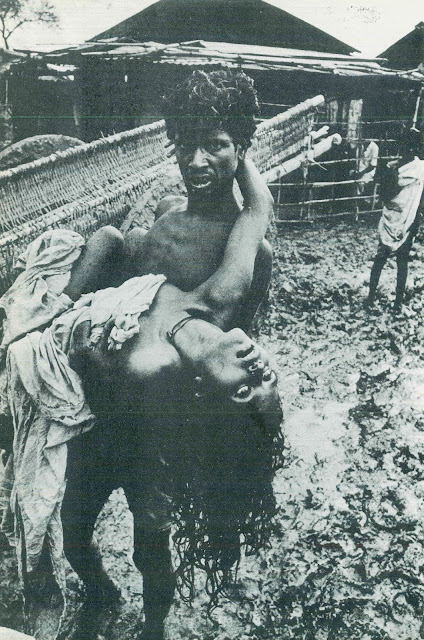The Bangladesh Liberation War broke out from March 26, 1971 until it ended on December 16, 1971. In a refugee camp in West Dinajpur, Bangladesh, a Bangladeshi husband carried the body of his female wife, debilitated and dying of severe cholera, in his arms for help in poor conditions. The Pakistani army searched for people who were particularly likely to join the resistance, sweeping up the youth in particular. The corpses of Bangladeshi youths were scattered floating in the fields and rivers.
The Bangladesh massacre was triggered by West Pakistan in East Pakistan on March 26, 1971. West Pakistani soldiers and military militias intervened in the Bangladesh genocide. West Pakistani troops attacked people in sight on the sidewalks of the capital Dhaka and destroyed buildings on the way. Tanks shelled the streets of Dhaka, indiscriminately blowing up people and buildings. They also shot and set fire to crowds of people in settlements. Tanks roared and cannons exploded in the main streets. The University of Dhaka and Hindu institutions were especially targeted. They executed genocide by looting valuables, raping women, and massacring unarmed civilians.
West Pakistan's military crackdown led to the outbreak of genocide in Bangladesh, known as East Pakinstan, on March 26, 1971; on March 27, rival Bangladesh declared independence. During the nearly nine-month-long Bangladesh Liberation War, West Pakistani troops and Islamist militias crushed Bengali nationalism, killing some 200,000 to 3,000,000 people. They also massively raped some 200,000 to 400,000 Bengali women in Bangladesh. About 8 to 10 million people, mostly Hindus in Bangladesh, have fled to neighboring countries as refugees. About 30 million Bangladeshis became refugees out of a total of about 70 million. The Bengalis committed racial genocide of the Urdu Biharis, about 1,000 to 150,000.
The U.S. made West Pakistan an ally in the Cold War. By December 16, India had forced West Pakistan into unconditional surrender and Bangladesh achieved independence.The 1948 United Nations Convention on the Crime of Genocide defined genocide as mass abuse and genocide that results in the total or partial destruction of a national, ethnic, racial, or religious group.

